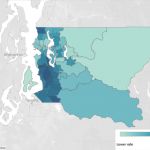CPHN
August 18, 2020
School awarded six COVID-19 population health equity grants

Nutritional Sciences Program faculty Jennifer Otten, Adam Drewnowksi, Sarah Collier, Yona Sipos among researchers involved in new UW Population Health Initiative COVID-19 healthy equity research projects. Read more about the studies in this story by UW School of Public Health.
August 3, 2020
Obama-era school nutrition policy led to better diets for students but faces changes

UW Nutritional Sciences researchers Jessica Jones-Smith, Cristen Harris and Kelsey Kinderknecth conducted the first nationally representative study to assess specifically how the 2010 Healthy, Hunger-Free Kids Act – championed by former first lady Michelle Obama and signed into law by former President Barack Obama – impacted the overall nutritional quality of school meals eaten by…
June 24, 2020
Statewide survey could map how COVID-19 is affecting food security, economics

Research studying food security in WA state affected by COVID-19 is highlighted, featuring project leads Adam Drewnowski and Jennifer Otten. The study is conducted in partnership with Washington State University, Tacoma Community College, and partners in local, county and state governments.
Study asks Washington state residents to describe food security and access during pandemic, economic downturn

Online survey launched by Center for Public Health Nutrition gathers data on how the COVID-19 pandemic and subsequent economic downturn have affected food access and economic security to Washington state residents.
June 5, 2020
It’s time to rethink the disrupted US food system from the ground up

Jennifer Otten and Sarah Collier, discuss a key vulnerability at the very foundation of the food system: soil. On farms and ranches across the U.S., the health of soil is seriously compromised today. The article covers what’s at stake if we don’t begin addressing this soil health as a key resource, and how we should…
June 4, 2020
Experts across campus discuss future of food supply system

A review of a UW experts panel discussing impacts on the food supply featuring core faculty members Jennifer Otten and Adam Drewnowski.
June 1, 2020
Faculty and students present at Nutrition Live Online 2020

Four members from the Nutritional Sciences Program will present this week at a free online event this week called Nutrition Live Online 2020, an event sponsored by the American Society for Nutrition (ASN). Adam Drewnowski, director for Nutritional Sciences and the Center for Public Health Nutrition will participate in a panel on sustainable food systems,…
May 4, 2020
New study to evaluate COVID-19 impacts on Washington State food security

As the COVID-19 pandemic unfolds, how and to what extent households are able to access food continues to change in the U.S. and across the globe. What are the impacts to our food supply and food security in Washington state? A new UW study funded by the University of Washington Population Health Initiative and the…
April 30, 2020
Initiative announces award of 21 COVID-19 rapid response grants

Nutritional Sciences Program researchers awarded Population Health Initiative grant to study impacts of COVID-19 pandemic on Washington state food systems, food security, and food access. Faculty involved in the project include Adam Drewnowski, Jennifer Otten, and Sarah Collier.
April 16, 2020
Seattle residents consuming fewer sugary drinks after city’s ‘soda tax’

New 12-month report co-authored by UW Center for Public Health Nutrition researchers Jessica Jones-Smith, Lina Walkinshaw and Vanessa Oddo offer surprise finding that one year after Seattle’s tax on sweetened beverages took effect, low-income children and their parents were consuming significantly fewer sugary drink.
Previous page Next page